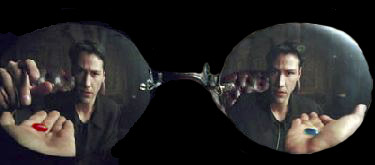We have a great discussion on 'status anxiety' among Christians that is occuring under the Star Wars post. Here is Gall's salient post (and reflections on a book by Alain de Botton) that will carry the discussion further...
"I think what catches me about the topic is that so much of life feels like trying to straighten a paper clip; just as it bends nearly to straight, it pivots between my fingers and I'm suddenly bending it the wrong way. I think about that with wealth and poverty - how poor is poor enough, and at what point does the focus on simplicity become an errant idol of its own? Faith and works. Experience vs. the voice of the Church. Left brain vs. right brain. Knowledge vs. open-mindedness. The fine line between following Jesus and getting ahead of him.
I want to trust in grace, but I also want to respond to it. I want to experience the sublime, but I don't want to fall in love with the voice instead of the speaker.
I think all of it comes down to an issue of adequacy, and even a well-crafted disregard for adequacy or inadequacy readily becomes its own claim to adequacy - or status. There was a time when I shaved my head to remind me that my only claim to adequacy was Jesus - no matter what looks I got from others. It worked for a while, but at a certain point that reminder became my badge of status; it proved that I wanted to know God enough to shave my head to learn something...cool of me.
The subtle and not so subtle pressures regarding status are pervasive and fluid - and it seems that even an effort to step out of the flow results in the loss of ground...and the lost ground is not so much a matter of social standing as it is a matter of self description. To the extent that those external pressures remain mysterious and stealthy, the ability to face them, choose them or reject them remains shackled.
Specialized knowledge is a comfort for a time: as you recall, Fr Neo, I bought the Nicene encyclopedia from you - and have read the bulk of it, and washed it down with desert fathers and Philokalia. It was - and in some ways continues to be - helpful, but it is not adequate to the task of living on its own...and neither are the giant thoughts and truths in that library. It's fascinating, and it certainly is aimed at real and ultimate things - transformational things - but even such high order specialized knowledge is often primarily valuable only in corresponding specialized arenas.
When the moment comes where I recognize that I've built yet another island of specialized knowledge, I have to decide what to do in response. Do I claim that the island is the whole world? Do I claim that the island is the only spit of land that matters? Do I abandon the island and swim for some other island or the mainland?
What dazzles me is that I don't think there's much alternative to developing specialized knowledge - and even the effort against its development becomes a specialization in its own right.
I wonder if there may be some way to enjoy the islands, but to hop among them. I don't mean to create some universalist or pantheistic structure with this - I just mean to live in a less self-conscious manner.
I live in a creative cycle of people - writers and artists and film makers and such. One night I went to dinner at this very fussy place with a very fussy, very elite-minded film maker and his wife. It was interesting, but the night was ruled by self-consciousness and specialized vocabulary (and the ability to use the vocabulary was less about actually communicating anything than it was about demonstrating the ability to use the vocabulary). I felt like one of the "cool kids," but it was an exhausting, nerve-wracking, doubt-inspiring night.
I spent the next evening with a couple in their vinyl-clad starter home. The husband was excited about the cheap stereo system he'd installed, and wanted to show me everything about his new Tevo setup. We ordered pizza. We watched American Idol. AND THEY CALLED IN TO VOTE!
There was no showing off with the second couple, and I found them to be vastly more enjoyable - and better for my soul - than the first couple. And as I compared the lives of the two couples, I quickly saw that the second marriage was better, the couple was more invested in their world and was clearly more "salt" in it, and their interests were more diverse and their internal pressures were clearly lower.
They were just happy little consumers - but the key to their quality of life was that they seemed to be almost completely unaware of the pressures of status and adequacy.
In their case, I think they've never been aware of the pressures. What I want to know is how, as someone who has been very much aware of them and the games that go along with them, how do I break free?
What made me post the information about the book this morning is that as I've been reading the posts over the past couple of months (I think I've read everything posted this year), I've seen a specialized knowledge, and I've felt a certain pressure to use the vocabulary of the specialized world.
That's not an all bad thing - especially given the fact that the discussions here, and the faith stripe represented in the people, have everything to do with moving in a direction the runs at crossed paths with what feels like a giant herd of American lemmings. Specialized knowledge and a specialized determination are critical to keep people from being swept in a direction they don't want to go. But the catch is that it is still a specialized knowledge, with a specialized vocabulary and specialized pressures, and at some point my assumption is that it will all feel suddenly like an island.
I don't think the trick is to stop growing the specialized knowledge; I think the trick is to know the island moment is going to come and to know what to make of the island dynamic not just when it arrives, but as the island is explored.
More from the back cover of the book: "a master explicator of our civilization and its discontents turns his attention to the insatiable quest for status, a quest that has less to do with material comfort than with love."
That seems like a topic worth considering. I know where the answers will be found (and I assume de Botton won't come to the same ones I will), but what grabs me about the book is that even though I know where the answers are going to be, I keep finding it darned difficult to manage the pressures I use on this bent paper clip of life, and I'd like to hear what someone else who's thinking about it has been thinking."





